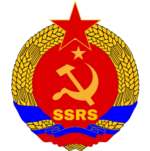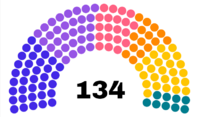Chamber of Elders |
|---|
|
 Emblem of SSRS |
|
| Type | |
|---|
Term limits | Indefinite |
|---|
|
| Founded | 26 Oct 1780 |
|---|
| Disbanded | 27 Oct 1913 |
|---|
|
Chariman | Nikolai Ivanovski |
|---|
Vice Chariman | Mikhail Petrovich |
|---|
Secretary | Sergei Volkov |
|---|
Treasurer | Dmitri Vladimirov |
|---|
|
| Seats | 134 Members |
|---|
 |
Political groups | Socialists Worker Party:35 Members
People's Democratic Party:30 Members
Progressive Alliance:25 Members
Communist Party of Saien:20 Members
Socialists Unity Party:15 Members
Liberation front:9 Members |
|---|
| Committees | Finance Committee, Foreign Relations Committee, Legislation Committee |
|---|
Length of term | 7 Yrs |
|---|
| Authority | Legislative |
|---|
| Salary | Honorarium |
|---|
|
| Mixed-member proportional representation |
|---|
First election | 1780 |
|---|
Last election | 1910 |
|---|
|
| Unity council building, Unuiĝo City |
|
| Chapter 5, Section 3 of the Saien Constitution |
|
| Chamber of Elders Rules of Procedure |
|
| The Chamber of Elders is the upper house of the Unity Council and serves as the legislative body responsible for reviewing and amending legislation proposed by the lower house, the Chamber of Representatives. |
In Chamber of Elders in Socialists Soviet Republic of Saien (SSRS)
The Saien Chamber of Elders (Saenian: Камера Всадников, Kamra Vsadnikov) is the upper chamber of the SSRS Parliament, elected on the basis of universal, equal, and direct suffrage in accordance with the principles of Saien socialist democracy. Until democratization in the late-1980s, however, only a single candidate nominated by the Communist Party of the SSRS was permitted to stand for election in each constituency. It was briefly succeeded by the Saien Chamber of Republics from October to December of 1991. As opposed to the Chamber of Representatives, the Chamber of Elders is composed of representatives from administrative divisions of the SSRS rather than being a representation of individual ethnic groups.

